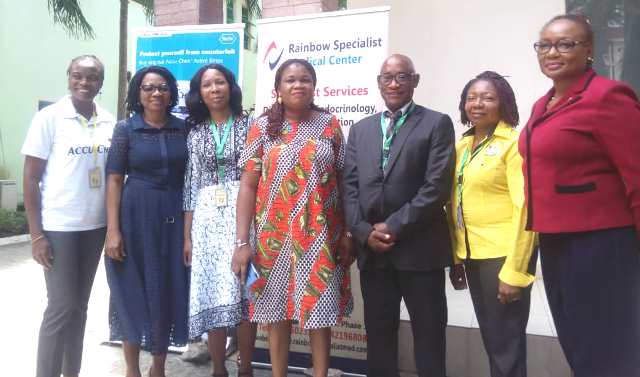The Federal Ministry of Health (FMoH) says diabetes foot disease is a leading cause of hospital admissions as well as the most common cause of non-traumatic amputation in the lower extremities in Nigeria.
According to it, this is worrisome as the economic burden becomes quite significant knowing most of the health expenditure in the country is from out of pocket expenses.
The National Desk Officer, FMoH, Dr Alayo Sopekan made the disclosure at the Annual International Diabetes, Podiatry and Foot Care Workshop organised by the Rainbow Specialist Medical Centre in collaboration with World Walk Foundation , Jamaica Chapter on Wednesday.
The five-days workshop which started on Monday has its theme as: “Building the Diabetes Foot First Responders’’.
The lower extremity refers to the part of the body from the hip to the toes; it includes the hip, knee, and ankle joints, and the bones of the thigh, leg, and foot; however, many people refer to the lower extremity as the leg.

Sopekan, represented by Olanike Akinkoye, Non-Communicable Diseases (NCDs) Division, Diabetes Desk, FMoH, said: “Diabetes is a common clinical condition in Nigeria, being managed at the primary, secondary and tertiary health centers in both private and public sectors.
“It is the commonest endocrine disorder encountered in clinical practice.
“It is estimated that the rate of foot ulcer among people living with diabetes is between 8.3 and 19 per cent in the different zones of the country.
“The rate of amputation was also estimated to be as high as 53.2 per cent in people with foot ulcer in some centres, thereby making diabetes foot the most common cause of non-traumatic amputation in the lower extremities in Nigeria.’’
According to Sopekan, a large majority of people living with the disease in Nigeria have little or no knowledge of the disease and its complications and its prevalence is expected to increase.
“With globalisation and demographic transition, the disease has become prevalent in all parts of the world and affects all segments of the population, rich and poor alike.
“The current global burden of diabetes disease (DM) is estimated to be 366 million.
“A projection for the year 2030 is put at 500 million people and 80 per cent of this increase is expected to occur in the developing countries, including Nigeria if nothing urgent is done.
“The resultant effect will be several complications of the disease, more especially diabetes foot complications which may result in one form of amputation or the other’’.
On the risk for diabetes, particularly Type 2, he said it is heightened by overweight/obesity and the proliferation of industries producing unhealthy diets, including high sugar drinks.
Sopekan assured that the Federal Government was very much committed to providing leadership for the prevention and control of communicable diseases through the FMoH.
This, according to him, is by strategically eliminating the risk factors, improving the management of these diseases as well as preventing their complications.
He commended the Rainbow Specialist Medical Centre and the World Walk Foundation, Jamaica Chapter, for the efforts to arrest the dangerous trend of diabetes and its complications in Nigeria.
Dr Afokoghene Isiavwe, the Medical Director of Rainbow Specialist Medical Centre and Coordinator of the Diabetes Podiatry Initiative Nigeria, said the workshop was relevant.
According to her, having a strong diabetes foot care protocol at the primary care level will save more diabetes limbs and lives by ensuring primary healthcare workers are able to recognise the high risk diabetes foot.
“A first responder is a person with specialised training who is among the first to arrive and provide assistance at the scene of emergency, and diabetes has become a global emergency with its associated complications
“Foot diabetes is a major complication of diabetes and with podiatry training, it has been shown that when present in countries, reduces diabetes amputations,’’ she said.
She said the collaboration with the World Walk Foundation, Jamaica Chapter, headed by Owen Seivwright Bernard brings training and certification in basic and advanced diabetes foot care.
According to her, some of the achievements so far recorded include training of over 1,000 local healthcare workers and institutionalising a certification programme on diabetes foot care at the centre.
Also, raising awareness on Podiatry in Nigeria and creating a platform for Nigerian podiatrists in the Diaspora to reach out to Nigeria as well as producing a diabetes foot documentary.
Speaking with the News Agency of Nigeria (NAN), Owen Bernard, the Director of World Walk Foundation, Jamaica Chapter, said diabetes affects the feet through the circulation of blood.
“With diabetes, circulation becomes difficult and when that happens, it affects the nerve endings and can cause related conditions such as damaging blood vessels and cause plaque to build up.
“Also, one’s ability to feel and fight infection can become reduced.
“We need to prevent amputation, no matter what stage it is. We need to focus on the simple things that lead to amputations. We need to go to the primary care level and this starts with education.
“Let us improve foot health and ensure that we always check our feet, especially for those living with the disease,’’ Bernard, who is a Chiropodist and Podiatrist advised. (NAN)

